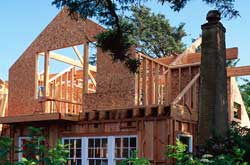The Ins and Outs of Recyclable Building Materials
See if We Have Top-Rated
Green Residential Contractors in Your Area

A few decades ago, people looking to build or remodel might not have worried too much about sustainability. Today, on the other hand, there is increasing interest among folks looking at a construction project concerning where their materials come from and where they are liable to go in the future. Green building is a growing trend, and using recycled materials (as well as materials that can be recycled) is something that homeowners and service providers alike are becoming more aware of.
Three Ways to Recycle Building Materials
Though those concerned with the environmental effects of filling landfills with scrap building materials are coming up with more and more ways to reduce waste, these three tried and true practices can be used by any homeowner during any remodel right now.
Buy Recycled Products
1. The first and probably most obvious way to reduce landfill waste in your remodel is, of course, to insist on using recycled materials in your project. By purchasing materials that are produced from scrap, you are making a dent in the amount of waste brought to a landfill. More importantly, you are supporting the companies that are concerned about this issue and are doing their best to be a part of the solution. Not only can you feel better about the materials you are using by buying recycled, you are also supporting the companies who produce those materials and sending a message to those who do not.
Reuse What You Can
2. Reusing materials and fixtures might be considered the purest form of recycling. Of course, you don't want your newly remodeled kitchen to look exactly like your old kitchen. But, by looking elsewhere for materials to reuse, you can give your new kitchen a completely different look without spending the energy used to produce a new material or fixture.
Architectural salvage companies have made quite a business by taking quality fixtures like sinks, counter, and flooring from buildings that are being remodeled or demolished and either refurbishing them or selling them as is. Those who go this route may find that purchasing a wood floor from a century old barn or a bathroom mirror salvaged from an old hotel will not only be good for the environment, but good for your home, as well. Using classic materials (much like purchasing antiques rather than buying new) can give your remodel a sense of authenticity and history that new materials simply don't carry; combine that with the fact that you're doing something good for your children and your children's children, and it's easy to see the appeal of using salvaged materials.
Want your recyclable materials picked up? Use this link for
Recycling and Junk Removal Services
Make Sure Your Materials are Recyclable (and Recycled)
3. Building green encompasses the past, the present, and the future, too. While purchasing recycled materials and reusing materials and fixtures that have already been produced is certainly a great start, an effort should also be made to use materials that can be reused and recycled in the future. Purchase materials you know to be recyclable so that when they eventually wear out, they can be turned into something new by the next person. While you can certainly discuss with your contractor which materials are easily recycled, a good rule of thumb is to focus on installing fixtures that are composed of a single substance or a material that can easily be broken down into single substances (i.e. aluminum, concrete, steel, gypsum, glass, etc.) rather than those with several components (like vinyl siding).
Remember, however, that a material that is 100% recyclable doesn't do anyone any good if it still winds up in a landfill. When you are remodeling, make sure the recyclable waste your project produces is not simply lumped in with everything else and brought to the dump. If the company you are working with doesn't have a recycling plan, don't be shy. This is your project, and if you want your scrap materials recycled when possible, a good contractor is more than likely going to be happy to work with you!
More Tips & Advice For Your Home
- Related Articles
- Recent Articles

